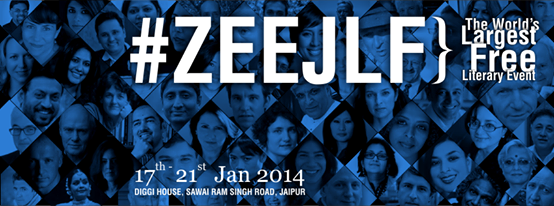"1 City, 5 Days, 6 Venues, 175 Sessions, Over 240 Authors, 700 Books and 2.2 Lakhs of Literature Lovers"
Yes, I am talking about the Jaipur Literature Festival. People have called it “The Biggest Literary Show on Earth” or “A literary melting pot in India’s Pink City” but for me, this festival is no less than heaven, thinker’s paradise, a literature lover’s delight, a pilgrimage for voracious readers & listeners and so on.
It was a place where people from every corner of the world came together to witness 5 days of non-stop debate and discussion on topics varying from history to music and fiction to biographies. The sessions were more interesting this time with the addition of few special theme based sessions like crime and punishment, democracy, women, endangered languages and not to forget the launch of the Crime Writer's Association of South Asia.
The statement of the festival director and renowned author, William Dalrymple, “A testament that books still matter” was enough to convince me how big this year’s JLF went. This year, the Lit Fest witnessed the presence of over 2.2 lakh visitors and a record single day unique visitor count of 75,210 on Sunday. Though the Weather Gods were not on the Festival’s side and it was a bit damp this year. The festival started with chilly winds blowing across the venue, forcing people to wrap themselves up like little babies and when the festival ended, God made sure everyone surviving was carrying an umbrella. The last day rain changed the venues of the sessions from large lawns to small rooms of Diggi Palace – which reminded us of the early years of the Lit Fest, yet it failed to stop the flow of visitors to the festival as there was an 25% increase in footfall this year; all thanks to the festival coordinators and organizers for increased capacity & arrangements.
Though big guns like Javed Akhtar, Shashi Tharoor, Barkha Dutt, Mary Kom, Katherine Boo and Bina Ramani didn't make it to the Fest; there were personalities who gathered a hell lot of audience and applaud. The literary program included two Nobel Prize winners, Amartya Sen and Harold Varmus as well as Man Booker, Pulitzer, Crossword, Samuel Johnson, Commonwealth, Hawthornden, Orange, Neustadt, Sahitya Akademi, Padmashree, Costa and DSC Prize long listed, shortlisted and winning authors.
One of the most amazing addition to this year’s list of speakers was Jhumpa Lahiri & 'The Great American Novelist' Jonathan Franzen (as titled by the TIME magazine). The critically acclaimed novelist and essayist who has received numerous accolades, including the National Book Award and was also a finalist for the Pulitzer Prize for Fiction. Jonathan managed to surprise many by being much less of a curmudgeon than most expected him to be while Feminist Gloria Steinem and Amish Tripathi also notched up huge audiences.
Expecting a controversy free Festival was something organizers were praying for but that was way too much to ask for. The comment of Ved Mehta on Narendra Modi as ‘Danger to India’ on the day 1 of the festival heated up the cold and chilly winter mornings. Considering the last time it turned into a political hotbed, this year's festival was more nuanced as there were no controversies that came up later, except when a few members of the Rajput Karni Sena made some noise about an Ekta Kapoor’s serial on Day 4.
So, once again, the big & free literary festival gave a tremendous show to the public, where they get to see their literary heroes up close at no extra cost as we conclude the Seventh Annual Jaipur Literature Festival 2014.
- Aman Sharma
One of the most amazing addition to this year’s list of speakers was Jhumpa Lahiri & 'The Great American Novelist' Jonathan Franzen (as titled by the TIME magazine). The critically acclaimed novelist and essayist who has received numerous accolades, including the National Book Award and was also a finalist for the Pulitzer Prize for Fiction. Jonathan managed to surprise many by being much less of a curmudgeon than most expected him to be while Feminist Gloria Steinem and Amish Tripathi also notched up huge audiences.
Expecting a controversy free Festival was something organizers were praying for but that was way too much to ask for. The comment of Ved Mehta on Narendra Modi as ‘Danger to India’ on the day 1 of the festival heated up the cold and chilly winter mornings. Considering the last time it turned into a political hotbed, this year's festival was more nuanced as there were no controversies that came up later, except when a few members of the Rajput Karni Sena made some noise about an Ekta Kapoor’s serial on Day 4.
So, once again, the big & free literary festival gave a tremendous show to the public, where they get to see their literary heroes up close at no extra cost as we conclude the Seventh Annual Jaipur Literature Festival 2014.
- Aman Sharma









